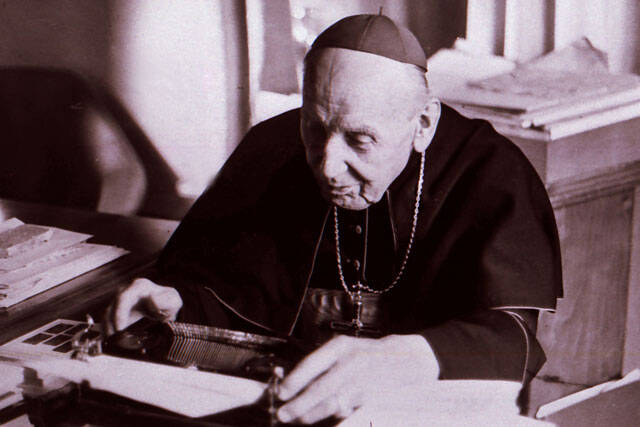As some of our readers know, we are posting weekly archive articles to www.conciliaria.com, a Web site that is tracking the developments of Vatican II as they happened 50 years ago. America readers may find these archive articles of interest, so when appropriate, we will also post them here to the blog.
Fifty years ago, the council was on break between sessions, so one of its leading lights, Cardinal Augustin Bea, was visiting the United States. A Jesuit, Bea received a warm tribute from America editor Walter M. Abbot, S.J., who later went on to edit the English translation of the Documents of Vatican II:
The words “humble,” “gentle” and “love” were in frequent use to describe Cardinal Bea while he was in this country. Thus, the president of 100-year-old Boston College, in conferring the degree of Doctor of Civil and Canon Law on the cardinal, said that “in this humble German scholar, this gentle Roman prince, as in none other save Pope John the Great, we find our hope for a united flock which may hear unblushing testimony to the still pre-Christian world: ‘See how these Christians love one another.’”
The slightest hint of criticism from such a man, therefore, would be striking. In the first of his talks during Harvard University's four-day Catholic-Protestant colloquium, the cardinal said: “We can even hope that this genuine spirit [of ecumenical attitude and concern] will grow more intense, especially if there be present [at the Second Vatican Council] more delegate-observers from the venerable Orthodox Churches of the East.” In his third and final talk at Harvard, the cardinal quoted Heidelberg professor D. Bornkamm, president of the German Evangelical Union, as saying that every Christian as well as every denomination has an interest in the Second Vatican Council. “In this light,” the cardinal continued, “one can see a certain justification for the criticisms which have been directed against church authorities, for instance, of the Baptist Alliance and the Greek Orthodox Church, who did not send observers to the Council.”
In all of his talks, the cardinal stressed that readiness to listen to each other surely gives witness to the working of God’s Spirit among those who hear the name of Christ. The cardinal’s frequent references to the World Council of Churches and the Anglican Church, to Dr. W. A. Visser 't Hooft and the Archbishops of Canterbury, clearly showed how much he respected the working of the Holy Spirit in these world bodies and officials who have been outstanding in the cooperation they have given the cardinal and the Secretariat of which he is the head.
Basic to Cardinal Bea’s whole approach to unity is, as he said, “the fact that we seriously accept the New Testament teaching of baptism and its consequences. Each baptism, validly conferred, makes one a member of the Mystical Body of Christ and therefore effects an organic union with Christ and an intimate relationship with all the other baptized.” He obviously rejoiced in saying: “The realization that we are all members of Christ has really spread like wildfire.”
Read the full article here.








